A new hop: How the hunt for a B.C.-optimized beer ingredient could spark revival of a once-mighty industry
CBC
Sat, October 21, 2023
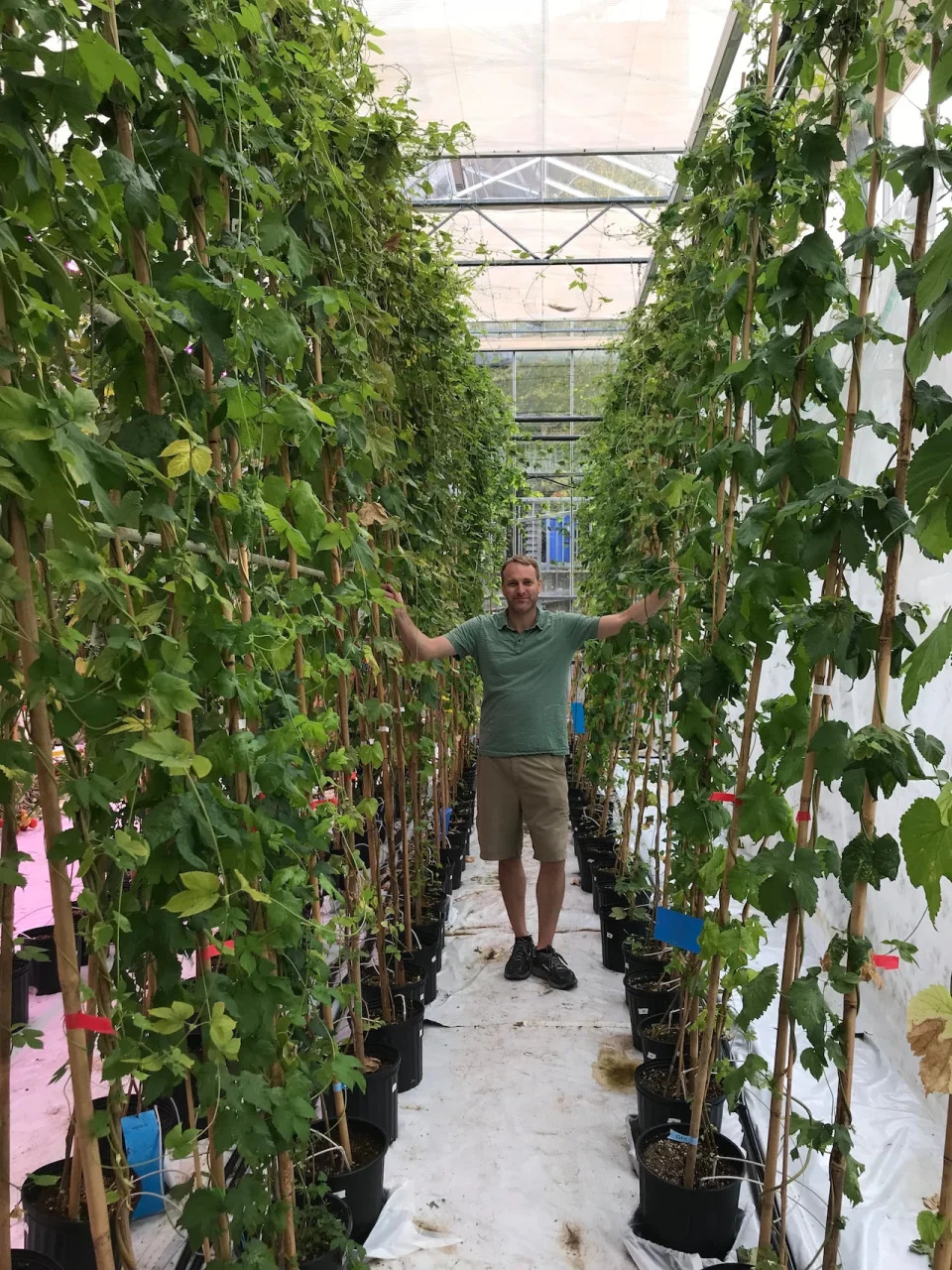
A research program in British Columbia is aiming to help revive the province's once-mighty hop industry by developing B.C.-optimized strains of the beer ingredient.
Since 2019, the NextGen Hops development program at Kwantlen Polytechnic University (KPU) in Langley — about 50 kilometres southeast of Vancouver — has been breeding plants that will thrive in the province's climate and potentially lead to the creation of a signature B.C. hop, in the same way some current varieties are associated with major producing regions like southern Germany and the U.S. Pacific Northwest.
Together with the small group of the province's remaining hop growers, the aim is to "get more acres in the ground and hopefully develop the next great hop to make the farmers happy and the brewers happy," said Mathias Schuetz, a molecular biologist and biochemist at KPU who is leading the NextGen Hops program.
B.C. was once the biggest producer of hops in the Commonwealth, with production focused mostly in the Fraser Valley, but the industry began to dwindle in the 1950s in the face of foreign competition.
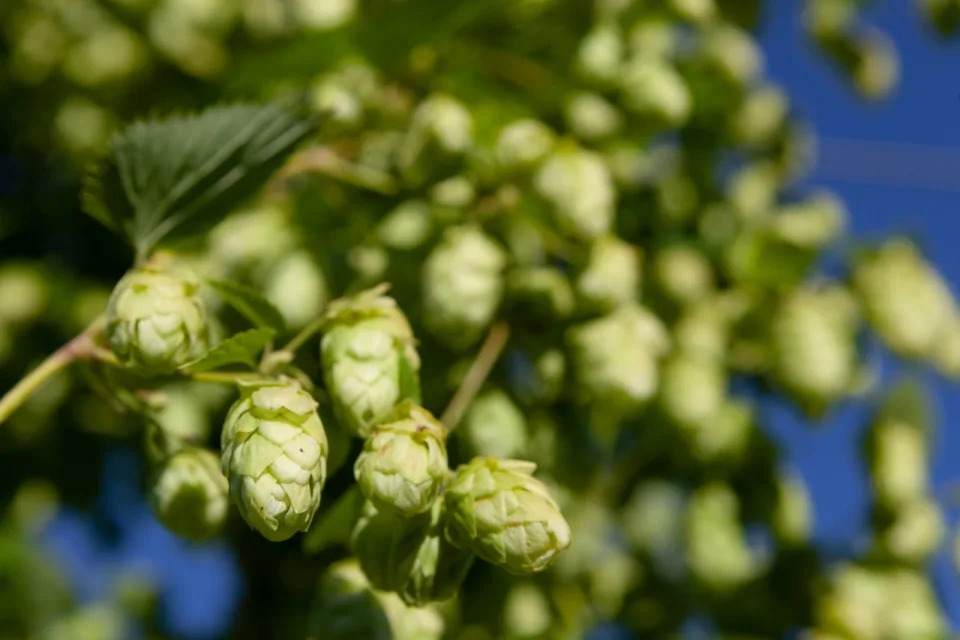
Hop cones ready to be picked in the hop yard at Barnside Brewing in Delta, B.C., in September. (Andrea Klipp)
The province's industry today is tiny — with just five commercial-grade farms cultivating not more than 50 acres, according to members of the B.C. Hop Growers Association — especially compared to its giant competitor to the south, where Washington's Yakima Valley produces the largest annual yield of hops in the world across thousands of acres.
While much of the hops used by breweries across Canada is imported, mostly from the U.S., growers and researchers believe the KPU program is laying an important foundation for future success and development here.
Head start with 'feral' hops
The hop plant, humulus lupulus, which is grown on tall trellis structures due to its climbing nature, produces bright green cones in late summer and early fall that have been prized as a beer ingredient for centuries.
Hops were primarily used in beer for their bitter and preservative qualities, but interest this century has tended to focus more on the aromas and flavours different varieties provide.
The goal of the NextGen Hops program is to create a type of hop that has a high yield to maximize profit and is disease-resistant, particularly to the mildew that can blight the crop in southwest B.C.'s relatively damp climate.
Schuetz and his team have leaned on the province's brewing past for help in isolating these qualities by seeking out "feral" hops left behind by the industry in the 20th century. These plants have thrived in the wild along roads, waterways and rail lines across the Lower Mainland for decades, meaning nature has already done some of the lab work.
"They're not being cultivated, they're surviving well in the wild with disease pressures that are all around them, so we're using them for breeding stock — using hops with these good traits and crossing them with varieties that are grown for aromas and flavours," said Schuetz, whose program has been boosted by a $250,000 grant from Genome B.C. to help with molecular analysis.

Mathias Schuetz in the lab with a DNA sequencing machine that his research team is using for a hop genomics program. (Garrett McCarthy)
But what would the exact aromas and flavours be in a signature B.C. hop? Salmonberry and salal? Cedar and kush?
"We're letting the brewers decide," said Schuetz, who's making use of KPU's in-house brewery to get brewing program students to test his cross-bred hops in batches of beer.
He concedes that the popularity of fruity hop flavours like berry, citrus and stone fruit could influence the profile, as well as an emerging trend toward the spicier notes of European hops.
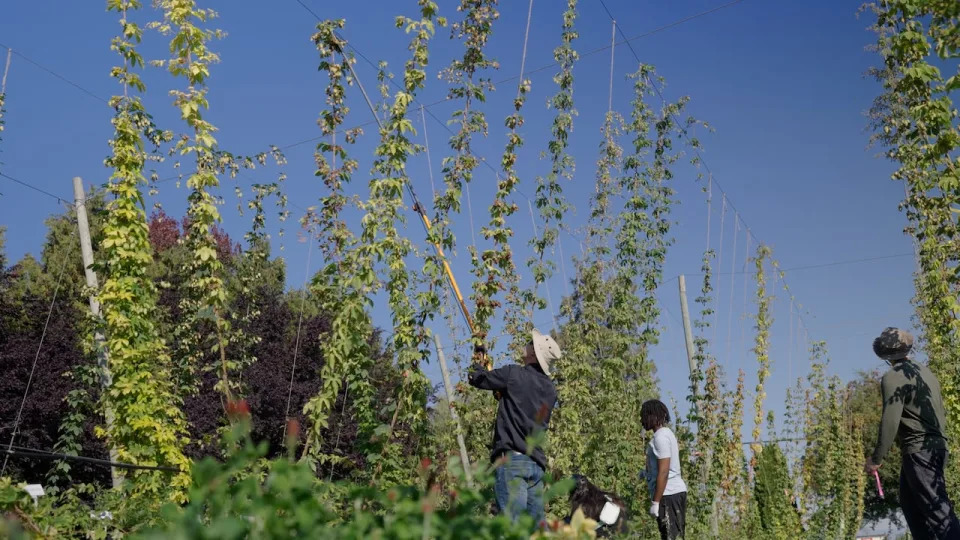
Staff and students from Kwantlen Polytechnic University's Applied Genomics Centre and brewing program help harvest hops at Crescent Island Hops in Delta, B.C., on Sept. 15. (Kwantlen Polytechnic University)
Local hops for local brewers
Schuetz took his research to the B.C. Craft Brewers Conference on Friday, in a bid to convince more beer-makers to opt for local when buying hops.
Growers say it shouldn't be a hard sell, seeing as B.C.'s booming craft beer scene already draws heavily on community support and collaboration.
"Everything about craft beer is more localized than just about any other business out there these days, especially in the age of Amazon," said Ken Malenstyn, chair of the B.C. Hop Growers Association and owner of Barnside Brewing in Delta, about 25 kilometres south of Vancouver.
"We'd like to tie ingredients to that story as well."
However, local brewers have been slow to put trust back in B.C. hops after a short boom-and-bust period in the mid-2010s that damaged the industry's reputation, said Malenstyn, who cited issues with operators who planned according to speculation and not demand.
"There was a lot of damage done — some small landholders lost their land; it really hurt the reputation of local growers; there were issues with product quality … so many issues," Malenstyn said.
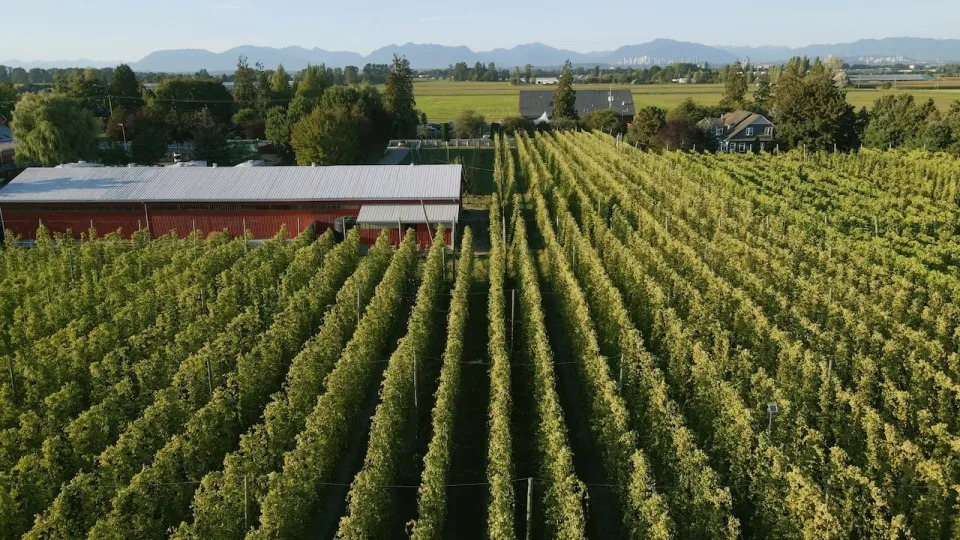
An aerial shot of the hop yard at Barnside Brewing in Delta, B.C. (Andrea Klipp)
One of the few established growers that remains to revive the industry is Topp's Hops in Abbotsford's Sumas Prairie, which handles all aspects of hop production, from growth through processing to delivery.
Despite the tiny stature of the industry in B.C., owner Mark Topper is confident there's room for growth once the pieces of high-quality research and local support connect.
"There could be a fivefold increase in what's being done right now, with some simple messaging and awareness to the brewers and a community connection … it's just getting the glue to bring it all together," said Topper, who has been growing hops on his family's farm since 2014.
There's also some long-term climate resiliency built into the industry in southwest B.C., in terms of ample water sources such as the Fraser River. A growing concern among the hop producers of Yakima is drought and high heat, Schuetz says, adding that yields are falling year after year in major hop regions of Europe due to extreme weather caused by climate change.
A new variety of high-yield, disease-resistant, aromatic hop can take 12 to 15 years to develop, Schuetz says, but he's hopeful the timeline can be shortened. He says he has three promising potential varieties, with one of them already planted over an acre-and-a-half in the Fraser Valley.
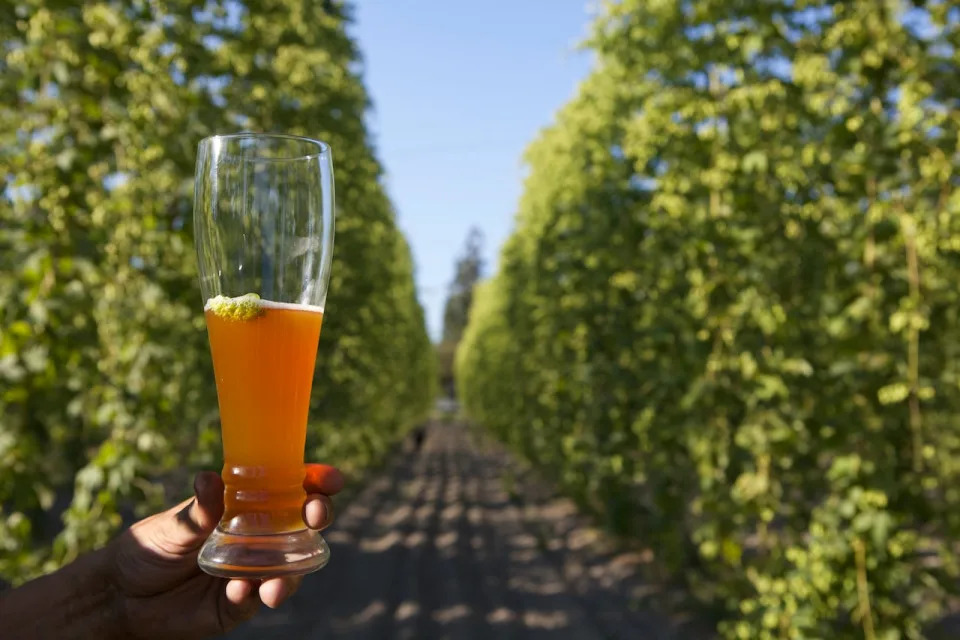
Hops is a primary ingredient in most beer, lending bitter and preservative qualities, as well as different aromas and flavours depending on the variety. (Andrea Klipp)
In the meantime, Schuetz, Malenstyn and Topper are all keen to point out that high-quality hops are already being produced in B.C. that show subtle terroir in the different soils they're grown in, whether that's in Abbotsford, Delta or Pemberton.
"We have excellent hops growing right now, with public varieties like Cascade, Chinook, Centennial," Schuetz said. "We're urging Canadian brewers to access them."
CBC
Sat, October 21, 2023

A research program in British Columbia is aiming to help revive the province's once-mighty hop industry by developing B.C.-optimized strains of the beer ingredient.
Since 2019, the NextGen Hops development program at Kwantlen Polytechnic University (KPU) in Langley — about 50 kilometres southeast of Vancouver — has been breeding plants that will thrive in the province's climate and potentially lead to the creation of a signature B.C. hop, in the same way some current varieties are associated with major producing regions like southern Germany and the U.S. Pacific Northwest.
Together with the small group of the province's remaining hop growers, the aim is to "get more acres in the ground and hopefully develop the next great hop to make the farmers happy and the brewers happy," said Mathias Schuetz, a molecular biologist and biochemist at KPU who is leading the NextGen Hops program.
B.C. was once the biggest producer of hops in the Commonwealth, with production focused mostly in the Fraser Valley, but the industry began to dwindle in the 1950s in the face of foreign competition.

Hop cones ready to be picked in the hop yard at Barnside Brewing in Delta, B.C., in September. (Andrea Klipp)
The province's industry today is tiny — with just five commercial-grade farms cultivating not more than 50 acres, according to members of the B.C. Hop Growers Association — especially compared to its giant competitor to the south, where Washington's Yakima Valley produces the largest annual yield of hops in the world across thousands of acres.
While much of the hops used by breweries across Canada is imported, mostly from the U.S., growers and researchers believe the KPU program is laying an important foundation for future success and development here.
Head start with 'feral' hops
The hop plant, humulus lupulus, which is grown on tall trellis structures due to its climbing nature, produces bright green cones in late summer and early fall that have been prized as a beer ingredient for centuries.
Hops were primarily used in beer for their bitter and preservative qualities, but interest this century has tended to focus more on the aromas and flavours different varieties provide.
The goal of the NextGen Hops program is to create a type of hop that has a high yield to maximize profit and is disease-resistant, particularly to the mildew that can blight the crop in southwest B.C.'s relatively damp climate.
Schuetz and his team have leaned on the province's brewing past for help in isolating these qualities by seeking out "feral" hops left behind by the industry in the 20th century. These plants have thrived in the wild along roads, waterways and rail lines across the Lower Mainland for decades, meaning nature has already done some of the lab work.
"They're not being cultivated, they're surviving well in the wild with disease pressures that are all around them, so we're using them for breeding stock — using hops with these good traits and crossing them with varieties that are grown for aromas and flavours," said Schuetz, whose program has been boosted by a $250,000 grant from Genome B.C. to help with molecular analysis.

Mathias Schuetz in the lab with a DNA sequencing machine that his research team is using for a hop genomics program. (Garrett McCarthy)
But what would the exact aromas and flavours be in a signature B.C. hop? Salmonberry and salal? Cedar and kush?
"We're letting the brewers decide," said Schuetz, who's making use of KPU's in-house brewery to get brewing program students to test his cross-bred hops in batches of beer.
He concedes that the popularity of fruity hop flavours like berry, citrus and stone fruit could influence the profile, as well as an emerging trend toward the spicier notes of European hops.

Staff and students from Kwantlen Polytechnic University's Applied Genomics Centre and brewing program help harvest hops at Crescent Island Hops in Delta, B.C., on Sept. 15. (Kwantlen Polytechnic University)
Local hops for local brewers
Schuetz took his research to the B.C. Craft Brewers Conference on Friday, in a bid to convince more beer-makers to opt for local when buying hops.
Growers say it shouldn't be a hard sell, seeing as B.C.'s booming craft beer scene already draws heavily on community support and collaboration.
"Everything about craft beer is more localized than just about any other business out there these days, especially in the age of Amazon," said Ken Malenstyn, chair of the B.C. Hop Growers Association and owner of Barnside Brewing in Delta, about 25 kilometres south of Vancouver.
"We'd like to tie ingredients to that story as well."
However, local brewers have been slow to put trust back in B.C. hops after a short boom-and-bust period in the mid-2010s that damaged the industry's reputation, said Malenstyn, who cited issues with operators who planned according to speculation and not demand.
"There was a lot of damage done — some small landholders lost their land; it really hurt the reputation of local growers; there were issues with product quality … so many issues," Malenstyn said.

An aerial shot of the hop yard at Barnside Brewing in Delta, B.C. (Andrea Klipp)
One of the few established growers that remains to revive the industry is Topp's Hops in Abbotsford's Sumas Prairie, which handles all aspects of hop production, from growth through processing to delivery.
Despite the tiny stature of the industry in B.C., owner Mark Topper is confident there's room for growth once the pieces of high-quality research and local support connect.
"There could be a fivefold increase in what's being done right now, with some simple messaging and awareness to the brewers and a community connection … it's just getting the glue to bring it all together," said Topper, who has been growing hops on his family's farm since 2014.
There's also some long-term climate resiliency built into the industry in southwest B.C., in terms of ample water sources such as the Fraser River. A growing concern among the hop producers of Yakima is drought and high heat, Schuetz says, adding that yields are falling year after year in major hop regions of Europe due to extreme weather caused by climate change.
A new variety of high-yield, disease-resistant, aromatic hop can take 12 to 15 years to develop, Schuetz says, but he's hopeful the timeline can be shortened. He says he has three promising potential varieties, with one of them already planted over an acre-and-a-half in the Fraser Valley.

Hops is a primary ingredient in most beer, lending bitter and preservative qualities, as well as different aromas and flavours depending on the variety. (Andrea Klipp)
In the meantime, Schuetz, Malenstyn and Topper are all keen to point out that high-quality hops are already being produced in B.C. that show subtle terroir in the different soils they're grown in, whether that's in Abbotsford, Delta or Pemberton.
"We have excellent hops growing right now, with public varieties like Cascade, Chinook, Centennial," Schuetz said. "We're urging Canadian brewers to access them."
No comments:
Post a Comment